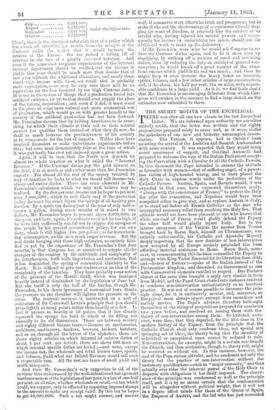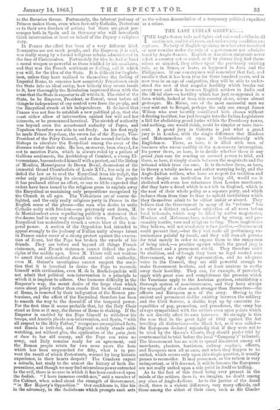THE SECRET MOTIVE OF THE ENCYCLICAL. T HERE was after all
one new clause in the lost Encyclical Letter. We are informed upon authority we ourselves- entirely credit, that the letter was written and the eighty propositions prepared solely to cover and, as it were, clothe- the nakedness of one new and hitherto unexampled denun- ciation. The Vatican, it appears, had in October been awaiting the arrival of the Austrian and Spanish Ambassadors with some anxiety. It was expected that they would bring secret assurances of support, and Cardinal Antonelli had prepared to welcome the vote of the Italian Parliament accept- ing the Convention with a Circular to all the Catholic Powers. In this document the Pope intended to assume the attitude so favourite with women—that of suffering angel, of a power- less victim of high-handed wrong, and to have placed the Holy Chair in express words under the protection of the- Catholic Powers. Austria, Spain, and Bavaria would, it was expected in that case, have expressed themselves ready, "always with the concurrence of France," to protect the Holy See after the evacuation, and Napoleon would have been compelled either to give way, and so replace Austria in Italy, or to stand out before all French Catholics as the man who- intercepted necessary relief from reaching the Holy See. That attitude would not have been pleasant to one who knows that while one-half of France would gladly defend the Papacy the other half would gladly injure Italy. But to the- intense annoyance of the Vatican the answer from Vienna brought back by Baron Bach, himself an Illtramontane, wa entirely unfavourable, his Catholic and Apostolic Majesty deeply regretting that the new doctrine of non-intervention now accepted by all Europe entirely precluded him from affording material assistance to Rome. Baron Bach, more- over, in communicating this decision counselled the Papacy to arrange with King Victor Emanuel for its liberation from debt, and—horror of horrors !—spoke of the Italian instead of the Piedmontese kingdom, and described its Government as one with Conservative elements entitled to respect. Don Pacheco almost at the same time brought a reply very similar in form from Madrid, and the Papal Court chafed into rashness resolved to condemn non-intervention authoritatively as an heretical. practice. It was not of course possible to denounce the prin- ciple alone, for it is exclusively secular, and, moreover, an Encyclical must always appear exempt from immediate and earthly motive. The Pope's advisers therefore bethought themselves of the string of propositions prepared for anathema two years before, and resolved on issuing them with the theory of non-intervention among them. So irritated, more- over, were they, that they departed, for the first time in the modern history of the Papacy, from the principle that the Catholic Church shall only condemn ideas, not special acts springing out of ideas, the theory being that the morality of individual or exceptional cases cannot be reduced to rule. Non-intervention, for example, might in a certain case benefit the Church, and then abstention, though in theory evil, might be resolved on without sin. In this instance, however, the zeal of the Pope outran all rules, and he condemns not only the theory but the practice of non-intervention without the customary qualifications—such as "major necessity," and thus actually over-rides the inherent power of the Holy Chair to dispense with obligations it has itself imposed. The observ- ance of the principle was condemned as well as the principle itself, and it is by no means certain that the condemnation will be altogether without• political weight, that it will not in a degree affect minds like those of the Queen of Spain, the Emperor of Austria, and the lad who has just succeeded
sonages both in Spain and in Germany who will henceforth! THE LIST INDIAN GRIEVAN.;,.l.
duty.
Gallican sentiments, the Archbishop of Cambrai, a strong prim gi fade case for sending an accused person to trial, and tramontane, hascontented himself with a protest, and the Bishop there, as here, it simply stands between the magistrate and the of Moulins, Monseigneur de Dreux Breze, descendant of the tribunal which tries the case. It is therefore there, as here, immortal. Grand Chamberlain of Louis XVI., has only so far in theory a totally useless and rather worryine.° body, and the defied the law as to read the Encyclical from his pulpit, the Anglo-Indian settlers, who have no respect for tradition and order only prohibiting its circulation. Among the people rather despise an institution for being old, would see it it has produced either no effect, or one so little expected that abolished with even less reluctance than London merchants. orders have been issued to the religious press to explain away But they have a dread. which is not felt in England, which is the Encyclical as containing only propositions recognized. by the root of their whole policy as a separate party, and which the Church in all ages. The Voltairians are of course de- induces them from time to time to uphold institutions which lighted, and the only really religious party in France in. the they themselves admit to be either unfair or absurd. They
Catholic unity with freedom—are grievously cast down, M. in view a distinct end,—the subjection of all races before de Montalembert even repudiating publicly a statement that local tribunals which may be filled by native magistrates,
the decree had in any way changed his views. Further, the Hindoos and tribunals, animated by strong, and pre- Encyclical has undoubtedly struck a severe blow at the tem- suinably hostile, race and religieus feeling. These magistrates poral power. A section of the Opposition had intended to they believe, will not absolutely refuse justice,—Government appeal strongly to the jealousy of Italian unity always latent could prevent that,—but they will make all preliminary ex- in France under cover of a strong protest against the evacua- aminations painful by insult, and they will commit persons tion of Rome, but the Pope has broken the swords of his for trial merely in order to expose them to the annoyance friends. They are before and beyond all things French of being tried,—a practice against which the grand jury is statesmen, and French statesmen cannot defend the prin- a sufficient and a permanent shield. They therefore resist ciples of the middle ages. Even M. Thiers will not venture its abolition, and although they have no legal control over to assert that ecclesiastical should control civil authority, Government, no right of representation, and no adequate even M. Guizot's mouthpiece cannot support the asser- voice in the Council, they are still powerful enough to
ton that it is heretical to desire the Pope to reconcile make Government hesitate, and at least anxious to soothe himself with civilization, even M. de la Rochejaquelein will away their hostility. They can, for example, if provoked, not admit that political non-intervention is a principle to apply with great ease and completeness the pressure which which it is impious to adhere. One immense difficulty in the the Venetians apply to the Austrian garrison, establishing a Emperor's way, the secret desire of the large class which thorough system of non-intercourse, and they have always cares about policy rather than creeds that he should remain the sympathy of a class much stronger than themselves—the at Rome, is removed by their indignation at the Roman pre- officers and European men of the army. Owing to the tensions, and the effect of the Encyclical therefore has been ancient and permanent dislike existing between the soldiery to smooth the way to the downfall of the temporal power. and the Civil Service, a dislike kept up by excessive in- For the first time it seems probable that, let the Holy Chair equalities of pay, promotion, and precedence, the army has stand as firm as it may, the throne of Rome is shaking. If the always sympathized with the settlers even upon points which Emperor is enabled by the Pope himself to withdraw his do not directly affect its own interests. So strongly is this troops, and Austria pleads non-intervention, and Spain, "with the case that in the great fight of 1852 against the Act all respect to the Holy Father," recognizes accomplished facts, levelling all. distinctions—the Black Act, as it was called— and Russia is irritated, and England calmly stands aside the Europeans declared repeatedly that if they were not to watching, not without glee, the application of the peinx forte be tried by the Queen's Courts, they should prefer trial by et dure to her old enemy, and the Pope can raise no courts-martial to trial before the local "Company's" tribunals. army, and Italy remains ready for an agreement, and The Government has no wish to spread discontent among all the Roman people retain for two more years the hate merchants, planters, barristers, railway employes, officers, which has been unquenched for fifty, what is to pre- and European men all at once, and when they happen to be vent the result of which Protestants, warned by long historic united, which occurs only upon this single question, it usually experience, in their hearts despair ? The Conclave expect pauses to reconsider. It may pause now, as the reform is very a miracle, but study to the utmost the history of both dis- unimportant, or if it does not, it will be because the Europeans pensations, and though we may find miraculous power entrusted are not really united upon a side point in itself so trifling.
to the evil, there is no case in which it has been conferred upon As to the fact of this dread being ever present in the the foolish. "I have immense confidence," said a member of minds of the settlers, there is, we imagine, no doubt among the Cabinet, when asked about the strength of Government, any class of Anglo-Indians. As to the justice of the dread "in Her Majesty's Opposition." Our confidence is, like his itself, there is a violent difference, very many officials, and in the adversary, in the foolishness which prompts such acts those among the ablest of their class, such as Sir Charles































 Previous page
Previous page